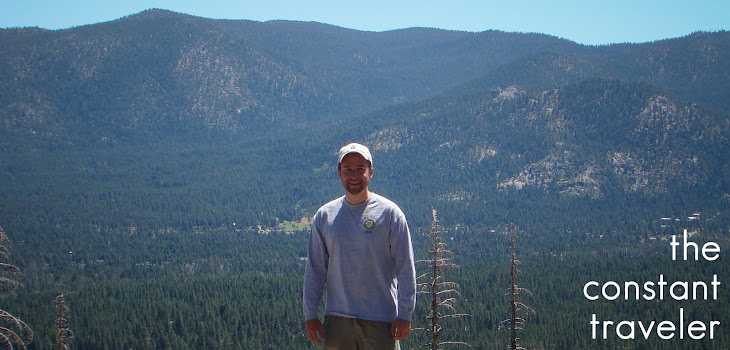


Tunisia is known for its doors, but are they known for how they look, or what they represent?
Back to full health, I treated myself to a walk through Sidi Bou Said yesterday. In the winding maze of neighborhoods, elegant, beautiful doors adorns the entrance to each house. Rows of purple and pink and white flowers spill over the front walls of the house, their colors harmonizing nicely with each door. They range from a traditional blue that mirrors the nearby Mediterranean, to yellows and pinkish reds to polished mahogany-brown.
But these doors have a different story to tell. Knock on any one of them and you'll feel a good inch of solid wood--solid to the point of coldness. On second glance, these beautiful doors have become iron gates to a fortress; a description that is quite accurate, considering the layout of Tunisian homes. Right to the curb of the street comes the white-washed walls of the property, tall and thick, the flowers lining the top of the wall serving a second purpose as a deterrent to climbing. Once past the outer gates, the property has a courtyard surrounding the main house, like a moat around a castle. And the castle itself has of course another door, usually smaller in size but nonetheless protective and impenetrable.
Wandering the streets, then, becomes an interesting experience. There are people around you, but they are hidden by all their doors. True, you'll find doors in the suburbs of Lodi or the San Fernando Valley. But suburbia has its lawns and wide driveways and gardens and large windows: all means of expressing identity, and all public and open for anyone to see. In Tunisia, their one door is like a keyhole--you can peek into their lives, but without a key, you'll never see them as they truly are.
This culture of doors is what makes the Arab World so different than the West. It is a sacred thing here, to truly know a person, to truly know "their name". Take for example the 99 Names of God. In Islam, these 99 Names are known and recited in the Qur'an. But there is a 100th Name that God only knows Himself. Saying a person's name is not merely an address or salutation in Arab culture; it is more of a command, a great power; because their name is being said by someone other than them. Same with images of people, too. The Prophet Muhammad is never depicted. In mosques, the walls are bare except for tile and calligraphy. There are few photographs in families' houses, and when visiting Facebook pages of Tunisian friends there is a noticeable absence of pictures.
Another aspect of this culture of doors is the attitude towards the genders. Women are revered as the most sacred of God's creatures; it follows to believers, then, to protect women from the corrupting forces of the world. The home--the fortress--is where women belong, barricaded in their safe, private sphere. As one of my Tunisian friends put it, "The men live in public; the women in private". You can see it in the overwhelming majority of Tunisian youths sipping tea together in cafes, walking the streets, getting groceries and so on. When women leave their sphere, they dawn the headscarves and shapeless clothing to keep themselves as private as possible.
But with modernity, this culture of doors is taking a very direction from its traditions. One amusing way of looking at this transition was put by another Tunisian friend of mine. I had noticed that a good majority of young women (high school/college) dawn a headscarf, but have a low-cut T-shirt and a very liberal style of clothing. "Tunisian women do this," my friend explained with a wry grin, "to solicit themselves for marriage. The headscarf tells the world 'Don't mess with me, I'm religious and I'm keeping myself pure until marriage'; but the liberal way of dress says 'And whoever does marry me is going to have quite the prize'."
It is interesting to consider the Arab World in this perspective; and even more so, our world in the West. If they are a culture of doors, are we a culture of windows? in that so there are so many parts of our lives that we freely give to others? In our modern era, with so many aspects of private and public life crossing over, is it healthy to let others know so much about us so easily? Further: with all the information we give out, do we give it out genuinely and intentionally? or do we give ourselves out because it is popular, or because we think that, the more people know about us, the more worth we have in their eyes?
This weekend I'll be heading to the Tunisian South, where I'll find the Sahara, the Island of Jerba, and one of the oldest mosques in the world.


Thought provoking article and in depth knowledg of Islamic culture David. Bravo!!!
ReplyDelete